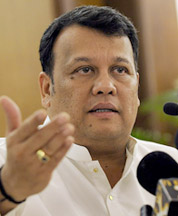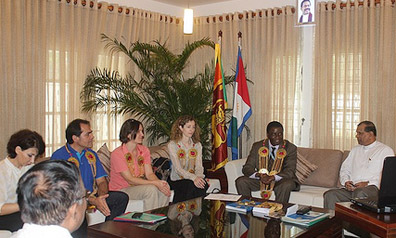|
'Lanka has worked with special rapporteurs':
Government invited Dr Beyani
By Manjula Fernando
|

Plantation Industries Minister and Special Envoy on Human Rights
Mahinda Samarasinghe
|
The visit to Sri Lanka of the UN Special Rapporteur on Displaced
Persons is not tied to the Human Rights Sessions in Geneva to be held in
March, but is part of the ongoing process between the United Nations and
Sri Lanka, Plantation Industries Minister and Special Envoy on Human
Rights Mahinda Samarasinghe said, shooting down claims that the UN
representative was here to prepare a damning report on Sri Lanka.
“This is not the first time that a Special Rapporteur on Displaced
Persons has visited Sri Lanka. During the era of terrorism, Walter
Kalin, who was the special representative of the Secretary-General on
Displaced Persons was invited to Sri Lanka, and he visited Sri Lanka at
least twice when I was the Human Rights and Disaster Management
Minister,” he said.
The special representative of the United Nations in Geneva on
Displaced Persons Dr. Chaloka Beyani arrived in Sri Lanka on Monday to
witness the resettlement activities and meet the people still waiting to
be resettled. He left the island on Friday.
“We are used to working with UN Special Rapporteurs, especially on
the issue of displaced persons, since Sri Lanka had to face a major
situation at the end of terrorism due to the LTTE's battlefront tactic
of using civilians as a human shield. We have always had cordial
relations with them and we have been working continuously with the UNHRC
who compliment Government efforts in looking after displaced persons and
resettling them. So we would naturally want to maintain that dialogue.
And it is in this context that he was invited.”
The Minister said Dr. Beyani was here on the invitation of the
Government. The UN Special Rapporteur on Education is scheduled to call
over in January, again, on the invitation of the Government.
Met many ministers
|

UN Special Rapporteur on Displaced Persons Dr. Chaloka Beyani
meets Defence Secretary Gotabaya Rajapaksa |
The visiting UN envoy met Minister Basil Rajapaksa, Minister Mahinda
Samarasinghe and several others at the Parliament on Monday before
leaving for Jaffna and Mullaitivu. Minister Rajapaksa spearheaded all
needs of the displaced people, facilitating them in welfare villages,
with resettlement and livelihood restoration work, in his capacity as
the Chairman of the Presidential Task Force. He is still overseeing this
area.
After this meeting, Dr. Beyani sat down to a presentation by the
Presidential Task Force on what has happened from the day the 300,000
displaced persons were received up to now. It outlined what the
Government has done to make the resettlement sustainable, the challenges
that should be overcome in the future and the plan of action to overcome
those challenges.
Minister Samarasinghe said a significant amount of work which the
country can proudly boast of, has been completed and Sri Lanka could be
a role model for other countries facing similar challenges. The
challenges were surmountable, but within a short span of four-and-a-half
years, a lot has been overcome. Dr. Beyani had acknowledged that
considerable progress has been made and he was looking forward to
visiting these places and seeing the ground situation. He visited the
welfare village in Jaffna, of people displaced due to the High Security
Zones. Among the officials he met there were Northern Province Governor
G.A. Chandrasiri and Chief Minister C.V. Wigneswaran.
He met External Affairs Minister Prof. G.L. Peiris on Thursday and
Defence Secretary Gotabaya Rajapaksa on Wednesday.
Minister Samarasinghe said the Government welcomes visits of this
nature since Sri Lanka wants to show the progress that it has achieved.
“There is a lot of disinformation being spread and I suspect that some
of the politicians in the North, who have a very parochial political
agenda, will try to feed him with disinformation.”
Facts are stubborn
“No one can refute facts. There may be different views of the
situation, but facts are stubborn,” The Minister said, adding that the
UN envoy will take note of the facts when he presents his report to the
UNHRC in June next year.
“We are proud of what we have achieved and we would not hesitate to
invite those who want to visit the country. However, we expect them to
be impartial and objective in their evaluation and not to be influenced
by political agendas that some are trying to push within the framework
of the Human Rights Council.”
|

Dr. Chaloka Beyani meets Northern Province Governor G.A.
Chandrasiri. |
The Minister said there is a tendency for visiting UN envoys to meet
a selective number of heads of missions and civil society members who
are often critical about Sri Lanka's record.
At the very outset, the Government has conveyed that this tradition
needs to be shunned.
“It has been noted that there is selectivity when it comes to
arranging meetings with the Colombo-based diplomatic community. UN Human
Rights Chief Navi Pillai was one such person who met a selected number
of ambassadors.
“There are over 190 countries which are members of the UN, quite a
number of them have diplomatic missions in Sri Lanka and a number of
non-Western countries have helped Sri Lanka overcome challenges linked
to terrorism.
“We have objected to this tradition by the UN and I understand that
Dr. Beyani had met a few people outside the usual curve during his
visit, which is encouraging.
“This was the practice followed even when it came to meeting civil
society organisations. We insisted that a cross-section of all those who
are working in the North and the East should be given an opportunity to
meet the UN Special Rapporteur and put forward their positions.
“During Navi Pillai's visit, it was quite obvious that the meetings
were strategically pre-planned and pre-arranged to pick and choose those
who harboured negative opinions, who had political agendas to play out.
In such instances, naturally, a distorted side of the story will be
projected,” the Minister said.Dr .Beyani will submit a written
preliminary statement on his visit to Sri Lanka shortly after his return
and a detailed report to the UNHRC in June next year. |

